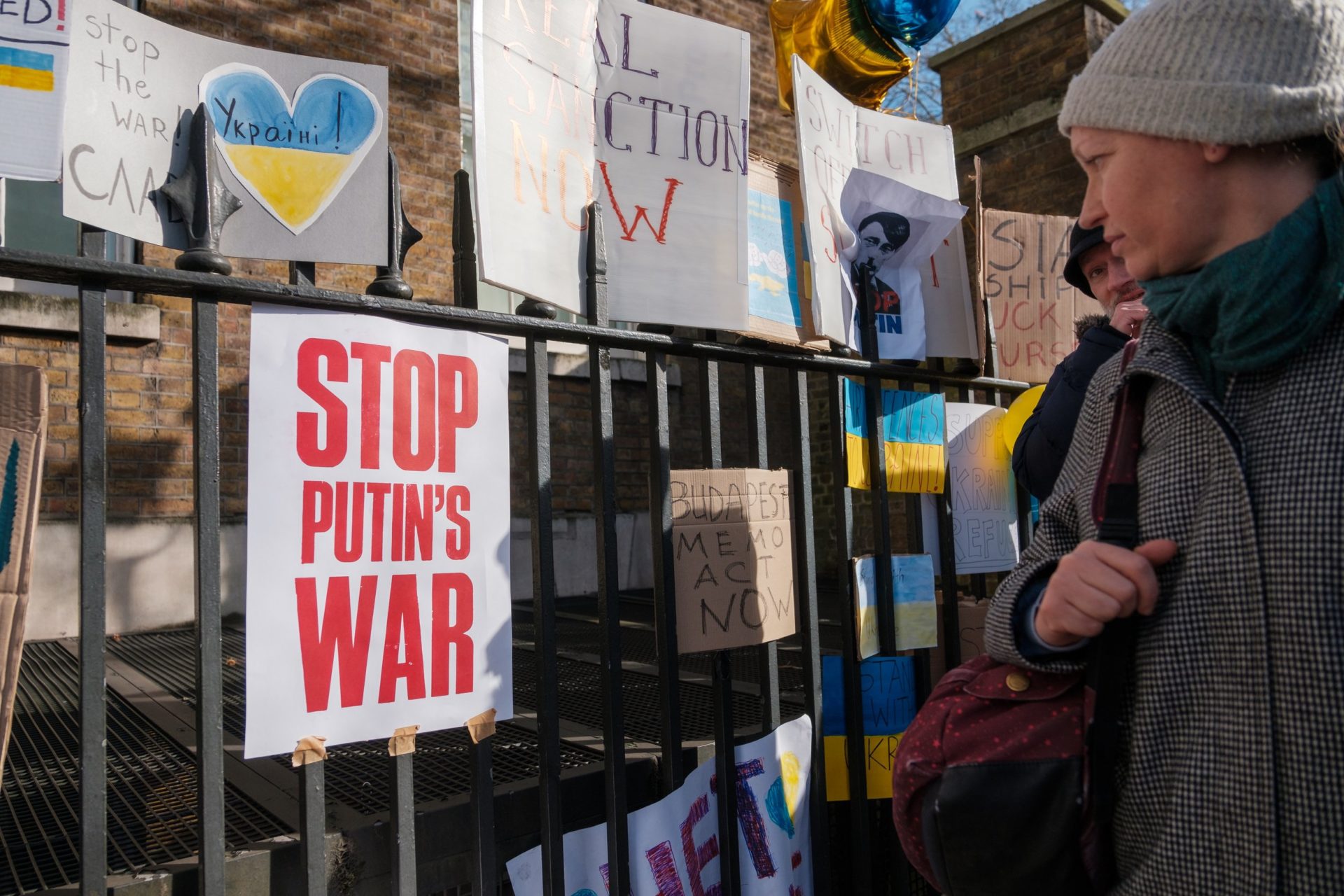
If the unfolding war in Ukraine has revealed one thing, it is that our outdated Cold War mindset is out of sync with the speed and veracity of the real-time information age we live in. In many ways, Ukraine is Cold War 2.0: a hybrid of conventional combat with information and economic warfare. Isolating a country from the global economy by severing its finances and people is not a new idea, but how it is being done is new. Ukraine is setting the stage for all future warfare.
While traditional warfare has conventional tactics in the form of guns and bombs, financial warfare, too, has had an arsenal of established strategies in the forms of sanctions and tariffs. And furthermore, financial warfare has also its own nuclear options. Being banned from SWIFT (Society for Worldwide Interbank Financial Telecommunications) is one, as is being barred from foreign exchange transactions using the major global reserve currencies. Freezing a country’s central bank assets is also another ruinous financial weapon.
These options have rarely been used in the past – and for good reason. To deploy any of these calamitous financial strategies does not only wreak havoc on the targeted nation, the fallout of each one reverberates across the global economy.
Following Vladimir Putin’s decision to invade Ukraine, the US, and the EU along with the UK, Canada, Japan, and Switzerland have deployed multiple nuclear options – collectively severing the nation from the global economy. In doing so, this Western alliance is embarking on a path of economic self-discovery. Fully cognizant of the traditional financial and trade sanctions, they have decided that these options were not enough to curb Putin’s imperialism. Consequently, they are scrambling to navigate and fully understand the efficacy of global/regional financial sanctions in the new age of digital globalization.
In the past, banning a country’s banks from SWIFT was equivalent to the financial nuclear option against a bad state actor. It essentially severed their main artery from the global financial markets by not allowing them to participate in the most efficient cross-border, multi-currency payment messaging system. Barring a nation from SWIFT is effective but has workarounds – old fashion and tedious methods of telexes, faxes, emails, or phone calls.
Additionally, banning Western banks from dealing with Russian banks and companies in the major reserve currencies of the world more or less shuts down all investment and trade transactions. The workaround of using third-party currencies like the Yuan (which has only 3% of SWIFT transactions vs. the USD 80%) is untenable. So too is relying on cryptocurrencies like Bitcoin. The volatility of crypto makes this a one-off rather than a sustainable business-financial model for entire nations.
The fallout of the financial nuclear weapons I mentioned above is arguably as consequential as real nukes. The most powerful traditional nuke is, ironically, a Russian-made hydrogen bomb named the “Tsar Bomba.” The equivalent “Tsar financial bomba”, is to sanction a country’s central bank and freeze all its foreign reserve assets – thereby destroying its currency, causing uncontrollable inflation, the inability to pay for vital import necessities, and eventually crippling the economy for decades to come. We did that in the past to Iran, and it is still crippled today. We have never dared to deploy that on a country with any real economic and political power fearing a “too big” disruption to the world economy.
Russia is the 11th largest economy in the world, but with only 1.6 trillion in GDP in 2020, it is a small economy when compared to the U.S. $37 trillion GDP that same year. To put it in perspective, its economy is smaller than the size of New York’s; however, its dominance in oil, gas, and certain agricultural and metals sector on the world stage is significant. That is also not counting the fact that it is a nuclear power, the 8th member of the G-8, and a key member of the UN Security Council. It is a Cold War relic to be reckoned with a sizable landmass, army, maritime, and space presence.
We partially deployed the “Tsar financial bomba” against the Russian Central Bank by freezing approximately half of its $630 billion reserves. Putin has spent the last few years building a war chest of foreign reserves in anticipation of sanctions from a Ukraine invasion. This $630 billion war chest was to prevent Russia’s currency from freefall and insulate its economy and people from the impact of sanctions. If full sanctions against the Russian central bank are used and coupled with a complete oil and gas embargo, Russia will be fully crippled and backed into a corner. There is the chance that Putin will become even more dangerous on the cyber and nuclear front to the West.
What was unexpected in this new hybrid, Cold War 2.0 style of warfare is the usage of ESG (Environmental, Social, and Governance) as a weapon. We expected Meta (i.e., Facebook) and Twitter to do their usual blocking of content, but not the swift punishments from many global commercial companies. Large name corporate brands from McDonald’s to Apple to Volkswagen are pulling out of Russia and tripping over themselves to outdo their competitors due to the possible backlash – mainly “reputation risk.” Moreover, the Russian market of approximately 147 million consumers is not big enough for these corporates to risk potential boycotts from consumers back home. The potential PR fallout, coupled with supply chain and payment issues, makes the risk simply not worth it.
However, it is easier for some corporations to leave than others. Tech companies like Netflix can simply flip a switch, but McDonald’s has a large physical footprint and employees. In all likelihood, Putin will make good on his threat to nationalize the foreign investors assets who ran out and hand over the McDonald franchises to friends and family with “golden arches” intact. McDonald’s will not be able to do much.
Then we have the companies who are making their “good citizen” announcement of cutting back their involvement in Russia but are still doing some business to not harm the Russian people on humanitarian grounds (like Pepsi). Still, others have complicated legal franchise arrangements on the ground like Burger King and Marriott who do not actually own their entities.
The large brands that have chosen to remain in Russia – and have been silent to date – are making too much money to worry about their global reputations. Most of them are already tarnished before the conflict – think Big Tobacco companies such as Phillip-Morris and JTI.
Forget the traditional warfare of the Cold War. In the face of Putin’s invasion of Ukraine, the West has deployed a lethal barrage of crippling financial weapons, information war, and widespread ESG repercussions. This is the warfare of Cold War 2.0, and it is here to stay.

Scheherazade Rehman
Dr. Rehman is the Deans Professorial Fellow of International Finance and Professor of International Finance at the School of Business, and a Professor of International Affairs at Elliott School of International Affairs at the George Washington University. She is a subject matter expert on global financial markets and financial crises management, global economic/political/financial risk, digital disruption, and cybersecurity risk. She was the former-Director of the European Union Research Center (1998-2021) and former-Director of the World Executive MBA with Cybersecurity (2012-2019).
She is a two-time Senior Research Fulbright Scholar. She has appeared in front of the US House and Senate, and been guest manifold times on PBS Newshour, NPR, The Colbert Report, BBC World News, CNBC, Voice of America, and C-SPAN.






